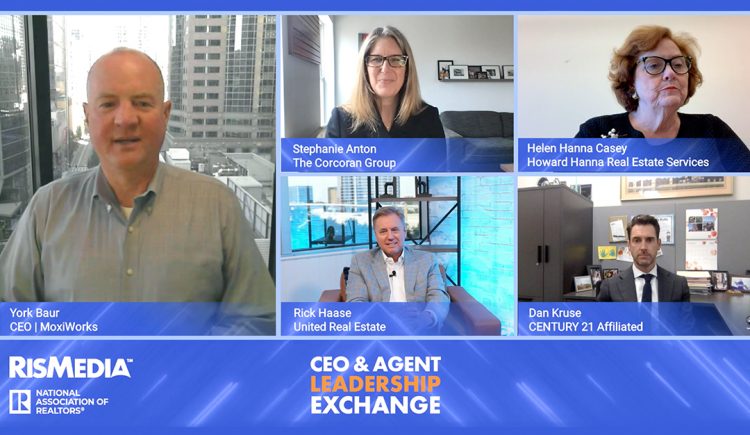On Sept. 14, RISMedia held its annual Real Estate CEO & Agent Leadership Exchange, this year co-presented by the National Association of REALTORS®. The exclusive, full-day, virtual event attracted thousands of industry professionals, featuring broker- and agent-focused sessions with real estate’s most influential and successful executives, brokers, agents, coaches and more.
A conversation that is every bit as important as the current overheated market—consolidation—was broached in a panel discussion in the broker track, titled “The Advantages and Challenges of Acquisitions, Roll-Ups and Mergers.” The panel was led by MoxiWorks CEO York Baur and the panel consisted of Stephanie Anton, SVP, Corcoran Affiliates, The Corcoran Group; Helen Hanna Casey, CEO, Howard Hanna Real Estate Services; Rick Haase, president, United Real Estate; and Dan Kruse, president and CEO, Century 21 Affiliated.
Although each panelist had somewhat differing viewpoints on nuances of consolidation, they all agreed on a couple fundamental takeaways: culture and technology are imperatives when considering mergers, acquisitions and rollups.
First, however, the panelists discussed why the current market is so fertile for consolidation.
“You can go all the way back into the ’70s to see when this started,” said Hanna Casey. “Constant changes in the market require constant changes in the industry.”
Haase agreed that much of it is indicative of the maturing market, and added that economies of scale allow for more efficient and effective operations.
Anton and Kruse also agreed, with Anton adding, “The ‘why’ is interesting at this moment, but the best scenario is when it makes sense for both parties.” Kruse said consolidation allows a company to “get to that next level.”
With the implications clear of why consolidation is happening and beneficial for the industry, Baur shifted his focus to understand what makes for a good partnership. He inquired if acquisition targets should be more strategic or opportunistic.
“It’s both,” said Haase. “It can be because of an exit strategy or value proposition void, so partnering is the only way. Sometimes you see growth, and somebody wants to be a part of our organization because they have a need. What drives those types of phone calls is their company is losing ground, so they need to learn how to compete with PE and VC money pouring into the industry. So they are looking for a sustainable future.”
Kruse, on the other hand, leaned more into the opportunistic camp.
“We have had the best growth through opportunities we may not have planned on,” he said. “Typically when we have targeted geographic areas we wanted to move into, those take more time and energy because it’s not set up with the opportunity right in front of you. And many times, you’re forcing culture or your model, so you may need the right people to help it move forward.”
This shifted the conversation to culture, where Kruse emphasized how important the human element is in dealmaking.
“When we moved into other markets and found that we liked the broker and the team and felt they could help us, those have been great fits that exploded us in territories we might not have been looking for,” he said. “It’s more about the people. When we can find a leadership team that believes in similar structures, has a similar model and similar culture, that’s a slam dunk for us.”
Hanna Casey had her own take on culture and how it intertwines with technology.
“It isn’t just that you have the same values or mindset on marketing and agents, but what’s really important today is the mindset for the future, and you have a team in place that agrees where you want to go and technology needs to be a part of that culture,” she said. “If they have systems that are antiquated and you believe they can be part of your future, you’ve got to be able to get them to believe that those systems don’t work for tomorrow.”
Baur, who himself is a technologist, had a similar take on technology’s role in acquisitions during a one-on-one discussion with RISMedia CEO and Publisher John Featherston, prior to the start of the panel.
“The main issue is the business itself,” he said. “We believe technology is critical to agent performance and productivity, which makes you more attractive to an acquirer. But if your tech isn’t up to speed that may be a factor why you should want to be acquired.”
RISMedia is providing free access to select sessions from the event. Hear from Baur in this insightful one-on-one with Featherston:
Miss the event? Click here to purchase access to all the sessions at a special discount.
Real Estate CEO & Agent Leadership Exchange 2021 Sponsors
Diamond Sponsors
Buffini & Company
Center for REALTOR® Development
Inside Real Estate
Real Estate Webmasters
Realty ONE Group
Platinum Sponsors
Elm Street Technology
MoxiWorks
Master Sponsors
Berkshire Hathaway HomeServices
Homes.com
LoneWolf Technologies
Host Sponsors
Leading Real Estate Companies of the World®
Rocket Mortgage
zavvie
ShelterZoom
Event Sponsors
Accredited Buyer’s Representative (ABR®)
David Knox Real Estate Training
Mbition
Pillar To Post Home Inspectors
RPR®
Sherri Johnson Coaching & Consulting
 Caysey Welton is RISMedia’s content director. Email him your real estate news ideas to cwelton@rismedia.com.
Caysey Welton is RISMedia’s content director. Email him your real estate news ideas to cwelton@rismedia.com.











